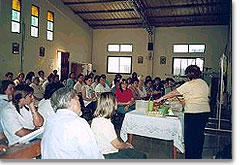 |
 |
Eva García en una de sus clases de cocinar
Eva García in one of her cooking classes
Eva García bei einem ihrer Kochkurse
|
|
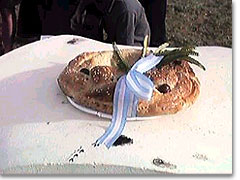 |
|
Producto de soja
Product of soy beans
Sojaprodukt
Foto: García © 2006
|
|
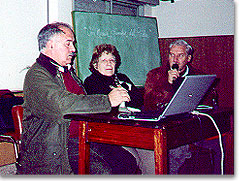 |
 |
Parte del Equipo Fundador de la Campaña de la Soja:
Jorge Zimmermacher, Eva García y Santiago Cerviño
Part of the founding team of the Campaign of Soy: Jorge
Zimmermacher, Eva García y Santiago Cerviño
Teil des Gründungsteams der Soja-Kampagne: Jorge Zimmermacher,
Eva García y Santiago Cerviño
|
|
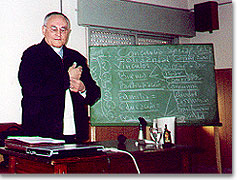 |
|
Padre Guillermo Carmona – charla sobre Pensamiento
Social
Father Guillermo Carmona – conference on Social Thinking
Pater Guillermo Carmona – Vortrag über soziales Denken
|
|
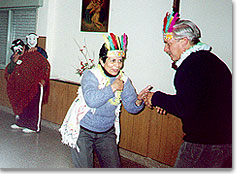 |
|
Sketch sobre aborígenes que descubren en la soja otra
fuente de alimentos – atrás el ganado agradecido!
Skit on Indians discovering soy as new source of food
– in the background, the grateful deer
Sketch über Indios, die Soja als neue Nahrungsquelle
entdecken – im Hintergrund das dankbare Wild
|
|
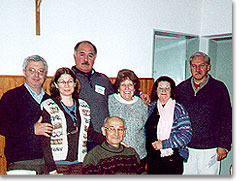 |
|
Equipos Fundador y de Chaco
Founding Team with the team from Chaco
Gründungsteam mit dem Team aus der Provinz Chaco
Fotos: Ojeda-Valussi © 2006
|
|
| |
|
ARGENTINA, Silvia and Alejandro Valussi. The first National Encounter
of the Soy.. Bean Campaign took place in the Shrine of Solidarity in Córdoba.
Leaders from 8 provinces of Argentina gathered with the participation
of Father Guillermo Carmona, who celebrated the Holy Mass after presenting
us with a talk about the thinking of the Founding Father in regard to
solidarity. The Soy Bean Campaign is an initiative of the Schoenstatt
Apostolic Movement that wants to make a cultural change in the nutrition
of the families who have difficulty obtaining daily sustenance. The activity
of this organization is spread in all of the country with the same speed
that the unmet basic needs of thousands of Argentineans are spreading.
The participants arrived at Córdoba – in the center and the heart
of Argentina – from distant and different points of Argentina: Tucumán,
Catamarca, La Rioja, Salta, Buenos Aires, Corrientes, Chaco and of course
Córdoba. Thez did not know each other personally, but there were
many things that united them and that made it a joyful and warm encounter.
Jorge Zimmermacher enthusiastically welcomed all with a joy that came
from an inflamed heart, and he transmitted the spirit of the Journey that
could be summarized in two key words that Father Kentenich used for Schoenstatters,
"Viritus Unitis" -"Uniting our strength".
Santiago Zerviño very seriously and soberly presented a historic
review of Argentina with the objective of positioning the participants
in the situation from which the Soy Campaign emerged. Through this presentation
thez could see, unfortunately, that over time Argentina began to lose
the culture of work.
The other face of the crisis called solidarity
The other face of the crisis in Argentina is called solidarity. That
is how the beginning of the Soy Bean Campaign can be summarized. This
is the attitude that the members a group of the Family Work from San Isidro
had when they began to offer tothousands of women, children and the elderly
the unmet nutritional needs, through an educational proposal oriented
to the good use of the soy bean. "We want to provide our most needy brothers
the nourishment for the soul and for the body. It is not so much about
distributing soy bean throughout all the country, rather it about educating
the people so that they will learn to use an inexpensive resource of excellent
quality, and at the same that they learn about God and the Schoenstatt
Family. It is about helping them to accomplish a better quality of life
for themselves and of sharing work and prayer like an authentic family",
synthesized Santiago J. Zervino, one of the creators and promoters of
the initiative. The idea emerged "when the newspapers published that Spain
donated 4,000 kg. of food to Argentina" and paradoxically "that same day
six boats left Argentina carrying 40,000 tons of soy beans". Once the
decision was made to begin with this project, Simmermacher, Poli and Zervinao
consulted with the producers of the area of Coronel Suárez about
the possibility of making an important donation of soy beans, which was
immediately accepted since it was a project that originated from the Sachoenstatt
Apostolic Movement, according to the producers. This is how the first
ten tons were obtained to initiate the campaign. With the collaboration
of the rest of the families of the group to which the trio that spearheaded
the Soy Bean Campaign belong, to date more than 10 thousand kilograms
in bags of 1 kilo have been distributed to 20 groups of the Family Work
of Argentina that enlisted to participate in the campaign. The soy beans
are bagged manually and it takes place in the regional centers of Coronel
Suarez and Villa Ballester (Buenos Aires), General Pay (Córdoba)
and Barranqueras Chaco).
Not to feed, rather to educate
The soy beans that are cleaned and divided travel from these locations
by transport cargo to the different areas of the country, where a defined
group of Schoenstatters, who are responsible for the project in these
places, wait for its arrival. Each diocese tries to educate instructors
so that they can teach the people how to prepare the meals. In each city
or town where the soy beans are destined there are people from the Movement
who are in charge of preparing the meetings for those who will receive
the service, during the meeting there is time to create bonds, give shelter
and to pray in a family atmosphere. In every encounter they try to also
nourish the hearts of the participants and to make them feel the company
of Our Mother of Schoenstatt, who is the Mother of Bread and Mother of
Grace. They prefer to form groups of Mothers and instruct them instead
of giving the soy beans directly to organized meal centers, because those
give food that is already prepared, without educating. Therefore, it is
clear that this apostolate is rooted with a pedagogical aspect. In this
sense they explained that "a properly trained instructor- usually a missionary
of the Rosary Campaign, a member of the Mothers’ Branch, or a person who
is willing, gathers a group of pregnant women, with or without children,
they distribute the little bags with a sufficient amount of soy beans
for a week, and they instruct them how to make a certain recipe. Then
while the soy beans are prepared, they pray the Rosary and talk about
some spiritual subject. At the end of the encounter, they are asked to
commit themselves to share what they learned with their families."
Allied with the Rosary Campaign
It is a wonderful experience of love of neighbor and it is a social challenge
to which Schoenstatt responds with concrete action and solidarity. It
is made possible by the Soy Bean Campaign allied with the Rosary Campaign
and other Branches of the Movement.
Ely and Carlos Armayo, members of the Rosary Campaign of Córdoba,
gave a historic outline of the Schoenstatt Movement and of the Covenant
of Love with Mary. They showed deeds and events that originated and gave
life to the Movement that welcomes the participants today and gives their
lives meaning.
The social doctrine of the Church was presented by Jorge Zimmermacher,
with a marked effort to unite heaven and earth. Of striving to be in solidarity
and with firmness and with the determination to struggle for the common
good so that all can all be truly responsible for everyone, which implies
much more than isolated acts.
Melba and Pedro López, Diocesan Coordinators from Corrientes,
introduced their audience to the subject of "To live in hope in difficult
times" in an atmosphere of spirituality and personal reflection. They
ended with a prayer with the phrase of the Father "With hope and joy and
confident in the victory we go with Mary into the newest times" giving
the Blessed Mother one of our weakness, willing to change it for love
of Her and our loved ones.
With their minds and hearts filled with the contents of the presentations,
with their notes in hand, all then silently went to the Shrine, to allow
God the Father to speak to them.
Sharing experiences
After a succulent meal, which was elegantly served, and after a restorative
rest, they saw a very well made Power Point presentation, which clearly
and educationally presented the objectives of the Soy Bean Campaign. In
another presentation, they saw photos of the different places where Eva
Garcia was present and offered her cooking courses, combined with Schoenstatt
pedagogy and prayer. The testimonies of those present enriched this task
with concrete action that evidently, comes from a divine inspiration.
And as it was to be expected, Father Guillermo Carmona, who has guided
this initiative since its beginnings, offered a very encouraging and challenging
talk. He made reference to fragments of the social thinking of Father
Kentenich and developed them into seven elements that are important to
everybody: To awaken the conscience and social action – solidarity of
destinies; The social as a weaving of attachments; To know how to use
resources – to value them, to use them, and to share them; Participation
– a fundamental attitude; the Family – without it there is no growth -;
Education – the family as a point of departure; Work – the means for everyday
sanctity; and he concluded with Authority – a true exercise of those who
are carrying this project forward.
Father Guillermo’s talk led to workshops where all shared experiences,
to then concentrate on an emphatic, dynamic and participative talk about
Leadership by Benjamin Paz from Tucaman.
Putting it into practice: cooking with soy beans
While one group was in the kitchen where Eva had brought everything prepared
with soy beans: tarts and pizzas. another group prepared sketches which
gladdened the lives with sauciness, creativity and with a sense of humor,
after a plentiful and tasty dinner,. There was also good musicthe sound
of the Litoral, sung by Luis Escobar from Corrientes, and the sound of
Buenos Aires with well tuned and heartfelt tangos sung by the most helpful
gentleman of the journey, Pablo Rega.
Jars with soy beans
In the morning, after nourishing the body and of addressing their prayer
to the Blessed Mother – in the words of Father Kentenich -, all gathered
in groups led by Silvia and Alejandro Valussi, Leaders of Rosary Campaign
of the Archdiocese of Chaco.
Besides sharing the joy and life that the Soy Bean Campaign generates,
the team work resulted in the following conclusions and suggestions:
- To periodically have annual journeys in different places of the country.
- To continue Training new instructors.
- To remain loyal to the strength that originated the Soy Bean Campaign
and to
- continue with the meetings of distribution of soy beans just as it
was suggested
- at the beginning.
- To integrate more people into the Campaign, not only directed to needy
people
- To form teams, where there are none, associating more people, generating
life and
- a spirit of solidarity.
All were well attended to at all times by a first class "team of hosts"
, composed by the family of Cora and Marcelo Lescano and their five children
who very affectionately and joyfully accompanied them at all times, from
very early in the morning until late at night.
There were also souvenirs for all the participants, little rosaries in
different amounts from the community of Salta, and miniature jars filled
with soy beans and with a picture of the MTA offered by the community
of Chaco.
The Holy Mass offered by Father Marcelo Gallardo for all the community
and all of us -along with the lunch which was tastefully served with the
distinction of best restaurants of the country, were the highlights of
the closing of the National Journey of the Soy Bean Campaign.
The participants arrived to the Shrine of Solidarity with much enthusiasm,
and departed to return to their homes, inflamed through the "Viritus Unitis"
of this journey.
Translation: Celina Garza, Harlingen, TX, USA
|






